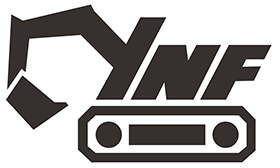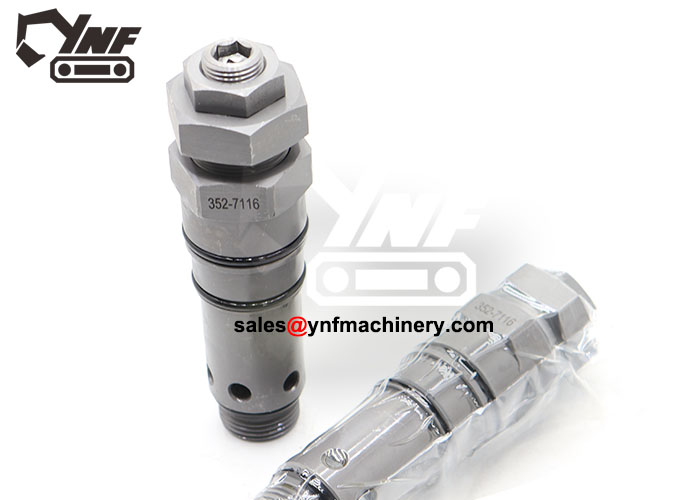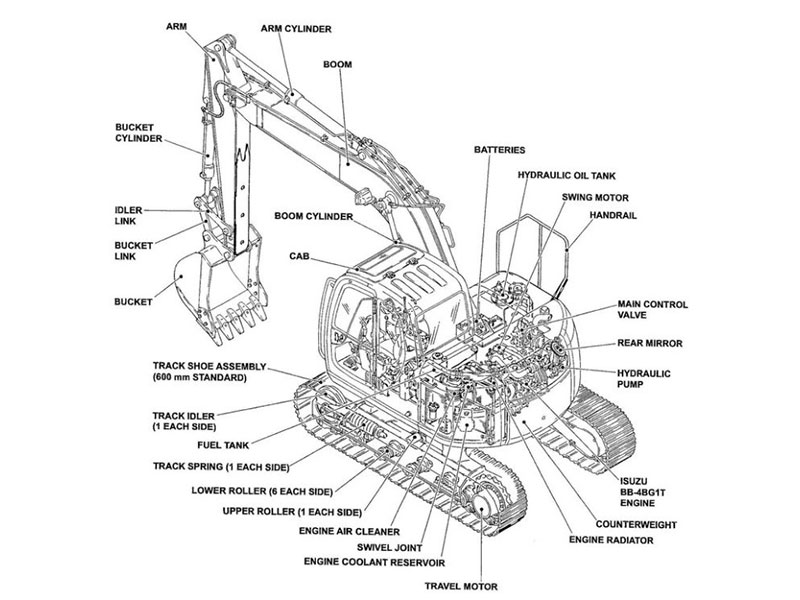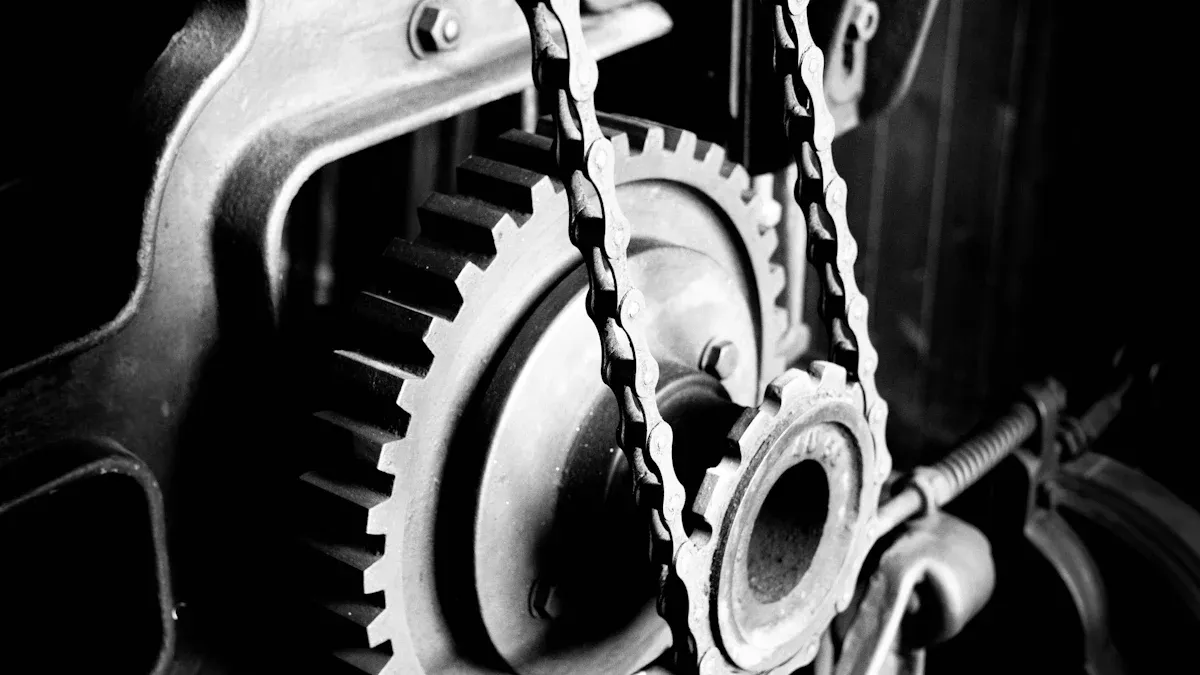
You can quickly find a reliable bulk excavator parts supplier by focusing on the right factors. Strong reliability in your supplier leads to better business efficiency and lower costs. For example, some suppliers in China offer lower prices because they are close to steel and iron sources. You can save up to 30% on transportation costs and reduce shipping fees by $5,000 to $10,000 per year with local sourcing. Reliable sourcing also means access to over 100,000 SKUs, so you avoid costly downtime. Use this guide to make your sourcing process simple and effective.
Tip: Review the table below to see how the right supplier choice can boost your savings and reliability.
Metric | Numerical Illustration | Explanation |
|---|---|---|
Transportation cost savings | Up to 30% | Suppliers near raw materials cut transportation expenses. |
Inventory size | Over 100,000 SKUs | Large stock supports urgent sourcing and reliable supply. |
Shipping cost savings | $5,000 to $10,000/year | Local sourcing reduces shipping fees and improves reliability. |
Key Takeaways
Choose suppliers who offer a wide range of genuine, certified parts that fit your excavator model to avoid downtime and costly repairs.
Buy parts in bulk from trusted suppliers to save money, get better prices, and ensure fast delivery with large inventories.
Check supplier reputation by reading reviews and testing their customer service to ensure quick support and reliable communication.
Verify quality through certifications like ISO 9001 and ask for proof of authenticity to protect your equipment and investment.
Use a clear checklist covering needs, compatibility, pricing, delivery, support, and warranty to make smart sourcing decisions.
Business Needs
Parts and Volumes
When you look for a bulk excavator parts supplier, you need to know your business needs first. Start by listing the types of parts you use most often. Many companies buy heavy equipment parts in large quantities to keep their machines running. You want to avoid delays, so check if the supplier can handle your order size. Some suppliers offer over 100,000 parts in stock, which helps you get what you need fast.
Trusted B2B platforms like Alibaba and Made-in-China connect you with verified bulk suppliers.
Value-added services such as OEM customization, free samples, and after-sales support make a big difference.
Detailed product specs, clear pricing, and warranty policies help you trust the supplier.
High-quality photos and condition reports are important, especially for second-hand or refurbished parts.
Secure payment options and proof of authenticity protect your business.
Category | Details |
|---|---|
Top Exporting Countries for Excavator Parts | China, India, Japan, South Korea, United Kingdom, United States, Germany, Italy, Spain, Turkey |
Top Import Ports in US | JNPT, Madras Sea, Delhi Air, Tanjung Perak, Tanjung Priok, Calcutta Sea, Gateway, Delhi TKD ICD, Madras Air, Southampton |
You should also ask about production lead times and supplier certifications. These details help you plan your orders and avoid downtime.
Compatibility
You must check compatibility before buying any heavy equipment parts. Each excavator model has unique needs. If the parts do not fit, your machine will not work right. Look for suppliers who provide clear compatibility information for every part.
Metric / Feature | Description |
|---|---|
Sensor Placement | Sensors on boom, stick, and bucket give depth and slope data. |
Calibration Parameters | Match to machine size, like boom length and bucket tooth radius. |
Accuracy Tolerance | Systems like Bobcat Depth-Check offer ±0.5 inch accuracy. |
Integration with Displays | Parts work with machine control panels for real-time feedback. |
External Guidance Systems | Support for GPS, GNSS, laser receivers, and total stations. |
Attachment Compatibility | Fit with standard buckets, tilting buckets, and tiltrotators. |
Automation Features | Automate tilt functions for better productivity. |
Always review the specs for each part. Make sure the heavy equipment parts match your excavator’s brand and model. Ask for calibration details and check if the parts support your machine’s control systems. Good compatibility means less risk of breakdowns and better performance.
Quality
Certifications
You need to check certifications before you buy excavator parts in bulk. Certifications show that the manufacturer follows industry standards for quality and safety. Look for ISO 9001 certification. This standard means the company uses a strong quality management system. Some suppliers also have CE or SGS certificates. These prove that the parts meet international safety and quality rules.
A certified supplier gives you confidence in the parts you buy. You can trust that the parts will fit your excavator and work as promised. Always ask for copies of certificates. Check if the documents are up to date. Reliable suppliers will share these without delay.
Tip: Make a checklist of certifications you need for your equipment. Use this list every time you evaluate quality in a new supplier.
Certification | What It Means | Why It Matters |
|---|---|---|
ISO 9001 | Quality management system | Ensures consistent quality and process control |
CE | European safety standard | Confirms safety and compliance for EU markets |
SGS | Third-party inspection | Verifies part quality and authenticity |
You should also check if the supplier works with oem manufacturers. OEM parts come from the original maker of the excavator. These parts match your machine’s needs and pass strict quality checks.
Genuine Parts
Genuine parts play a key role in your excavator’s performance and durability. When you use genuine parts, you get the same high-quality materials and engineering as the original equipment. This means your machine will run smoothly and last longer.
A Caterpillar case study shows that equipment with genuine parts can keep up to 25% higher resale value. These parts go through tough tests for durability in mining and construction. You get better engine performance, fuel efficiency, and less wear. This leads to fewer repairs and less downtime. You save money over time and keep your excavator working at its best.
A Komatsu PC-1250 excavator in the Sungun copper mine showed how important genuine parts and maintenance are. The study used reliability models to track how long the machine would last. It found that good parts and regular care helped the excavator work longer and better. The right parts protect your investment and improve performance.
You should always evaluate quality before you buy. Here are some checkpoints for evaluating part quality:
Ask for proof that the parts use high-quality materials.
Check if the parts come from a trusted manufacturer.
Make sure the parts fit your excavator model.
Look for clear labels and serial numbers.
Inspect packaging for signs of tampering.
Request test reports or inspection certificates.
Using high-quality parts from a reputable supplier helps you avoid frequent repairs. You get better durability and longer equipment life. Proactive maintenance and timely replacement of worn parts also boost performance and reduce downtime.
Note: Early detection of wear and using genuine parts can prevent costly failures. This keeps your excavator running and protects your business.
When you choose a supplier, always ask about their process for evaluating part quality. Reliable suppliers will explain how they test for durability and performance. They will also show you how their parts meet industry standards.
Pricing
Bulk Savings
You can save a lot when you buy parts in bulk. Many suppliers offer special deals for large orders of affordable heavy equipment parts. Bulk buying helps you lower the price per unit. This means you spend less on each part and keep your machines running without breaking your budget.
The market for affordable heavy equipment parts is changing. High costs for OEM parts push many buyers to look for more affordable options. You see more aftermarket and used parts available now. As inventories grow, prices for parts drop. For example, inventory levels for used excavators have gone up by almost 10% over the past year. Auction values for these machines have dropped by about 7% to 10%. This trend means you can find affordable heavy equipment parts at better prices than before.
Tip: Ask your supplier about discounts for bulk orders. You may get extra savings if you buy more parts at once.
You also benefit from digital marketplaces. These platforms make it easy to compare prices and find the most affordable heavy equipment parts. You can check inventory, see price trends, and make smart choices for your business.
Value
When you choose parts, you want the best value for your money. Value is not just about the lowest price. You need affordable heavy equipment parts that last long and work well. Good parts help your machines run smoothly and reduce downtime.
Here is a table to help you see what makes parts valuable:
Metric | Description |
|---|---|
Load Capacity | Strong parts handle heavy work and tough jobs. |
Durability & Lifespan | Long-lasting parts mean fewer replacements and less maintenance. |
Reliability | Reliable parts keep your machines working without problems. |
Compatibility | The right parts fit your equipment perfectly. |
Maintenance Reduction | Fewer breakdowns save you time and money. |
Cost-effectiveness | Affordable heavy equipment parts save you money over time. |
Performance Differences | Good parts improve how your machines work. |
Certifications | Certified parts meet high standards. |
Warranty Coverage | Warranties protect you from defects. |
You can choose between OEM and aftermarket parts. OEM parts cost more but offer perfect fit and long life. Aftermarket affordable heavy equipment parts can be just as good if they come from trusted suppliers. Look for certifications like ISO 9001. Warranties also show that the supplier stands behind their parts.
Regular maintenance and using the right parts help you save money. You avoid costly repairs and keep your equipment in top shape. Always compare the value, not just the price, when you buy affordable heavy equipment parts.
Delivery
Timely Delivery
You need timely delivery when you order bulk excavator parts. Fast delivery keeps your machines running and helps you avoid costly downtime. Many top suppliers stock over 50,000 parts, so they can fill your order quickly. Some companies use 12 warehouses across the United States to ship orders fast. You may even get free shipping on orders over $4,500, which saves money and speeds up the process.
Tip: Choose suppliers with nationwide shipping and large inventories. This helps you get parts when you need them most.
Customer reviews show that businesses prefer suppliers who keep enough stock for quick delivery. When you work with a supplier who meets tight deadlines, you reduce the risk of machine downtime. Consistent timely delivery builds trust and keeps your projects on track.
A case study from ABC Infra found a 20% increase in on-time deliveries after better communication with suppliers. Good communication helps you know when your excavator parts will arrive. This makes it easier to plan repairs and maintenance.
You should also think about the impact of local versus international suppliers. Local suppliers often offer faster delivery speed because they ship from nearby warehouses. International suppliers may have longer shipping times due to customs and distance. If you need parts urgently, local suppliers are usually the better choice for timely delivery.
Here is a table to help you compare local and international delivery:
Supplier Type | Delivery Speed | Shipping Cost | Risk of Delay |
|---|---|---|---|
Local | 1-3 days | Lower | Low |
International | 7-21 days | Higher | Medium to High |
You can see that local suppliers provide faster delivery speed and lower risk of delay. This is important when your excavator needs urgent repairs.
Order Capacity
Order capacity matters when you buy large volumes of excavator parts. You want a supplier who can handle big orders without mistakes or delays. Some suppliers use advanced systems like Cat Payload and VisionLink Productivity. These tools help operators weigh loads and track shipments. You get real-time data to make sure your order matches your needs.
Suppliers with high horsepower machines, wide undercarriages, and heavy counterweights can move more parts at once. This means they can fill large orders quickly. Extended service intervals and fuel efficiency also help by keeping machines available for longer periods.
Suppliers with large storage centers can handle bulk orders with ease.
Quick calibration and user-friendly systems reduce downtime and speed up order processing.
Professional support teams help you choose the right parts and manage large shipments.
Sunyue Excavator Parts and One Plus One Machinery both focus on prompt delivery and customer satisfaction. They use expert support and large inventories to make sure you get the right parts fast. This helps you keep your excavator fleet running at peak performance.
When you evaluate a supplier, ask about their order capacity. Find out how many parts they can ship at once and how they manage large orders. Reliable suppliers will explain their process and show you how they keep delivery on schedule.
Note: Always check if the supplier offers warranty coverage. This shows they trust their products and their delivery process.
You need a supplier who can provide timely delivery and handle your largest orders. This keeps your excavator fleet working and your business moving forward.
Support
Customer Service
You need strong customer service when you choose a bulk excavator parts supplier. Good customer support helps you solve problems fast and keeps your machines running. Many studies show that professional supplier support services reduce equipment downtime by 30%. You also see a 25% improvement in maintenance efficiency when you get quick support. Emergency response times, technical documentation, and training programs all play a big role in support quality.
Long-term supplier relationships with strong support can lower your operational costs by 25%. You also get a 40% boost in parts availability. These numbers show that support is not just about answering questions. You need knowledgeable staff, fast responses, and clear communication. When you reach out for customer support, you want answers right away.
A big problem in the industry is slow customer service. About 62% of suppliers do not answer customer service emails. When they do, it can take 6 to 24 hours. This slow support makes you less likely to use that supplier again. If you wait a whole day for a simple answer, your business suffers. Fast and accurate customer support builds trust and keeps your projects on track.
Tip: Always test a supplier’s customer service before you place a big order. Send a question and see how fast and helpful their support team is.
Warranty
Warranty coverage is a key part of supplier support. A good warranty shows that the supplier stands behind their parts and support. You want a supplier who offers clear warranty terms and fast support for claims. Warranty claims data gives you insight into supplier reliability. For example, a study using real data from an excavator manufacturer in China found that tracking usage rates and repair conditions helps predict failures better. This means you get better support and fewer surprises.
In 2022, global heavy equipment warranty claims reached $4.89 billion, or 1.04% of sales. Claims dropped by 8% from the year before, showing better reliability and support. Some top brands, like Caterpillar, saw claims fall by 9%. Others, like Deere & Company, had higher claims, which can signal weaker support or more part issues. Warranty accruals and reserves also show how much support you can expect in the future.
You should always check the warranty policy before you buy. Look for suppliers who make the support process easy. Good support means you get help with claims, fast replacements, and clear instructions. This keeps your excavator fleet working and your business moving forward.
Reputation
When you choose a bulk excavator parts supplier, you need to focus on reputation. A strong reputation shows that a supplier delivers quality and reliability. You want to work with trusted suppliers who have a proven track record. Reputation helps you avoid risks and ensures your business runs smoothly.
Reviews
You should always check reviews before making a decision. Reviews give you real feedback from other buyers. They help you see if a supplier meets delivery promises and provides reliable parts. Many trusted suppliers display customer reviews on their websites. You can also find reviews on independent platforms like Google or Alibaba.
Tip: Look for reviews that mention reliability, fast shipping, and good customer service. These points show that the supplier values reputation.
A table can help you compare reviews from different suppliers:
Supplier Name | Average Rating | Number of Reviews | Common Feedback |
|---|---|---|---|
Supplier A | 4.8 | 120 | Fast delivery, reliable |
Supplier B | 4.5 | 95 | Good support, quality |
Supplier C | 4.2 | 80 | Affordable, trusted |
You should read both positive and negative reviews. This gives you a balanced view of the supplier’s reputation and reliability.
Experience
Experience builds reputation over time. You want to choose trusted suppliers with many years in the industry. Experienced suppliers understand the needs of your business. They know how to handle large orders and solve problems quickly.
Suppliers with a long history often have better reliability. They have learned how to manage inventory and deliver on time. You can ask the supplier about their years in business and major clients. Trusted suppliers will share this information to prove their reputation.
Check how long the supplier has served the market.
Ask about their experience with bulk orders.
Look for awards or recognition that show strong reputation.
A supplier’s experience and reputation go hand in hand. When you choose a supplier with a solid reputation, you get better reliability and peace of mind.
Documentation
Certifications
You need strong documentation to prove the quality of excavator parts. Certifications show that a supplier meets industry standards. When you ask for certifications, you protect your business from low-quality or fake parts. Look for ISO 9001 certificates. This certificate means the supplier follows strict quality rules. Some suppliers also have CE or SGS certificates. These documents prove the parts meet safety and quality standards in different countries.
Always ask the supplier to show you up-to-date certificates. Check the dates and make sure the documents match the parts you want to buy. Reliable suppliers will give you these papers without delay. You can also check if the supplier is an authorized dealer. Authorized dealers usually have better quality control and follow strict rules. This helps you trust the parts you receive.
A table can help you remember what to check:
Certification | What It Proves | Why It Matters |
|---|---|---|
ISO 9001 | Quality management | Consistent quality and safety |
CE | European safety | Meets EU quality standards |
SGS | Third-party inspection | Independent quality check |
Tip: Keep a checklist of needed certifications for every order. This helps you keep your equipment safe and running well.
Authenticity
You must make sure every part you buy is genuine. Using real parts keeps your machines safe and working at their best. Fake parts can cause breakdowns and lower the quality of your work. You can follow these steps to check the authenticity of excavator parts:
Buy from authorized dealers or official distributors. They guarantee quality and authenticity.
Cross-check part numbers and look for security features like holographic stickers.
Use the official manufacturer website to verify parts and find authorized sellers.
Watch out for prices that seem too low. Very cheap parts often mean poor quality or fakes.
Ask for proper documentation or certificates from the seller.
Check if the parts are OEM or aftermarket. This helps you know the quality and fit.
Confirm warranty coverage and supplier accreditations.
Read customer reviews and check the supplier’s history.
You should also inspect the packaging. Look for official branding and clear part numbers. Compare these numbers with the manufacturer’s catalog. Only buy from certified suppliers. When you check the quality of the parts, you protect your machines and your business.
Note: Careful checks for authenticity and quality help you avoid costly repairs and keep your equipment safe.
Product Range
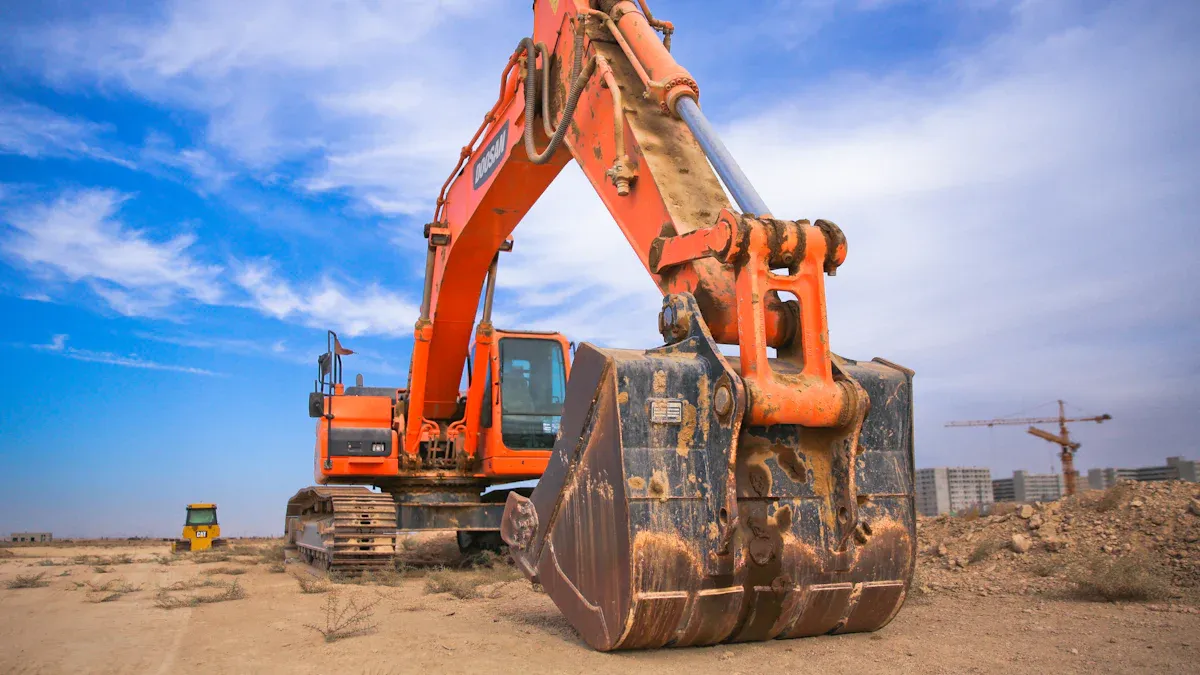
Variety
You need a supplier who offers a wide variety of excavator parts. A broad product range helps you find the right heavy equipment parts for every job. The excavator parts market includes many types, such as track chains, track plates, track rollers, sprockets, and idlers. Each part serves a different purpose and faces unique wear conditions. When you have access to many options, you can keep your machines running and avoid long downtimes.
The construction industry uses over 60% of all excavator parts, so specialized parts are important for this sector.
Manufacturers with a large product portfolio can meet the needs of agriculture, construction, and industrial users.
Frequent replacement of heavy equipment parts is common because of high wear and tear.
New materials and better manufacturing methods improve durability and reduce maintenance costs.
Companies with a wide selection can adapt to trends like sustainability and automation, helping you stay ahead.
A supplier with a full range of heavy equipment parts lets you choose the best fit for your machine. You get better performance, longer durability, and higher quality. This variety also helps you respond quickly to changing project needs.
Maintenance Services
You should look for suppliers who offer strong maintenance services for excavator parts. Good maintenance keeps your heavy equipment parts working at their best. Suppliers who follow industry standards help you avoid breakdowns and improve performance. The table below shows some key maintenance benchmarks:
Maintenance Aspect | Standard/Benchmark | Impact/Recommendation |
|---|---|---|
Parts Purchasing | Use original or certified parts meeting ISO, CE, or domestic standards | Reduces failure rate by ~20% due to parts mismatch |
Parts Replacement | Performed by trained technicians using standardized procedures | Operating error rate reduced to less than 5% |
Hydraulic Oil Replacement | Every 2000-3000 working hours | Prevents contamination; impurity concentration >5% requires replacement |
Air Filter Replacement | Every 500-1000 working hours or quarterly depending on environment | Maintains engine efficiency by preventing poor air filtration |
Hydraulic System Pressure | Maintain within 300-350 bar | Ensures system stability and prevents faults |
Electrical System Monitoring | Voltage and temperature fluctuations within ±10% | Prevents sensor failure and electrical faults |
Failure Rate Distribution | Engine and hydraulic systems account for ~80% of total failures | Focus maintenance efforts on these core systems |
Record Management | Use electronic file systems to log maintenance and replacements | Supports fault prediction and preventive maintenance |
Compatibility Checks | Verify part model, batch, and equipment parameters before purchase | Ensures system compatibility and stable operation |
Certification Standards | Parts must meet relevant certifications and third-party testing | Guarantees performance under high-load conditions |
Most end users now perform about 71% of their own maintenance, but more people are starting to outsource complex repairs. This shift happens because modern excavator parts and systems need expert knowledge and advanced diagnostics. When you choose a supplier who offers maintenance support, you get better quality, improved durability, and higher performance from your heavy equipment parts. Fast service and reliable repairs help you avoid long wait times and keep your excavator working hard.
Excavator Parts Manufacturer
OEM vs Aftermarket
When you start evaluating excavator parts manufacturers, you face a key choice: OEM or aftermarket. Each option has strengths and weaknesses. You need to understand these differences to make the best decision for your excavator.
OEM stands for Original Equipment Manufacturer. An OEM excavator parts manufacturer builds parts that match the exact design and quality of your original equipment. These manufacturers use strict controls and advanced systems to ensure every part fits and works perfectly. You get parts that meet the highest standards for safety, durability, and performance.
Here is a table that shows how OEM excavator parts manufacturers stand out:
Differentiator | OEM Excavator Parts Manufacturers |
|---|---|
Design Control | Follows detailed 3D models and technical drawings for exact fit |
Quality Management | Uses ISO 9001 systems and strict inspections at every stage |
Production Capabilities | Complete lines for forging, machining, and heat treatment |
Supply Chain Integration | Real-time tracking with ERP and MES systems |
Performance & Reliability | Focuses on stable processes and warranty compliance |
Risk Management | Identifies and manages risks in design, quality, and supply chain |
You can trust an OEM excavator parts manufacturer to deliver parts that protect your equipment and keep it running longer. These manufacturers offer:
Exact match to original equipment specifications for dependable quality.
Warranty compliance, which helps your excavator last longer.
Precise fitment, reducing the risk of breakdowns.
Strong distribution networks and authorized dealers for authenticity.
Higher costs and sometimes limited availability for older models.
Less flexibility for upgrades compared to quality aftermarket parts.
Dependence on OEM supply chains, which can mean higher prices or delays.
Aftermarket parts come from other manufacturers. These parts often cost less and may offer more choices for upgrades or custom needs. Some aftermarket manufacturers produce high-quality parts, but you must check their reputation and certifications. Not all aftermarket parts meet the same standards as OEM.
When you choose an excavator parts manufacturer, think about your needs for quality, price, and support. OEM parts give you peace of mind with strict quality and warranty protection. Aftermarket parts can save money and offer more options, but you need to check the manufacturer’s track record. Always compare both options before you buy parts for your excavator.
Bulk Excavator Parts Supplier Checklist
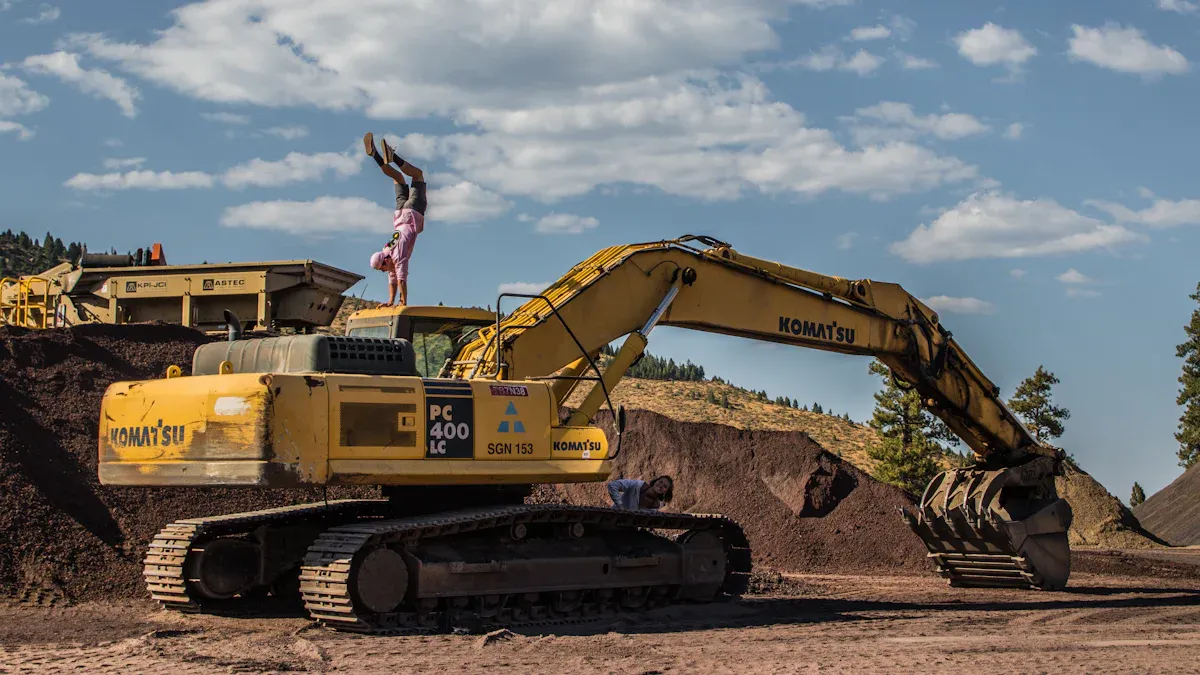
When you start sourcing for your business, you need a clear checklist. This helps you choose the right bulk excavator parts supplier. Use this list to make sure you do not miss any important steps.
Know Your Needs
List the exact parts you need for your excavator. Check the quantity and make sure you know the model numbers.Check Compatibility
Confirm that the parts fit your excavator. Ask the supplier for detailed specs and compatibility charts.Verify Quality
Look for certifications like ISO 9001. Ask if the supplier offers genuine or OEM parts.Compare Pricing
Request quotes from each bulk excavator parts supplier. Check for bulk discounts and see if the price matches the value.Review Delivery Options
Ask about shipping times and order capacity. Make sure the supplier can deliver parts quickly when you need them.Test Customer Support
Contact the supplier with questions. See how fast and helpful their support team is.Check Reputation
Read reviews from other buyers. Choose a supplier with a strong track record in sourcing excavator parts.Request Documentation
Ask for certificates and proof of authenticity for all parts.Evaluate Product Range
Make sure the supplier offers a wide selection of excavator parts. This helps you with future sourcing needs.Understand Warranty Terms
Review the warranty policy. A good supplier stands behind their parts and helps with claims.
Tip: Print this checklist and use it every time you evaluate a new bulk excavator parts supplier. Careful sourcing protects your excavator and keeps your business running smoothly.
Here is a quick reference table for your sourcing process:
Step | What to Check |
|---|---|
Parts List | Models, quantities, specs |
Compatibility | Fit for your excavator |
Quality | Certifications, genuine parts |
Pricing | Bulk discounts, value |
Delivery | Speed, capacity |
Support | Fast, helpful responses |
Reputation | Reviews, years in business |
Documentation | Certificates, authenticity |
Product Range | Wide selection of parts |
Warranty | Clear, fair terms |
You can make smart sourcing decisions by following these steps.
Focus on quality materials and check compatibility for strong excavator performance.
Balance cost and quality to save on repairs.
Look for clear pricing to avoid surprises.
Choose fast delivery to keep your machines working.
Review warranty terms for better protection.
Test customer support for quick help.
Check supplier reputation and certifications for reliability.
Pick OEM or trusted aftermarket parts for the best performance.
Use this checklist every time you start sourcing. Careful sourcing leads to better performance and long-term savings.
FAQ
What should you look for in a supplier’s customer service?
You should check if the supplier answers questions quickly. Good service means you get help with orders, tracking, and returns. Fast responses show the supplier cares about your business.
How can you confirm the quality of excavator parts?
Ask for certificates and test reports. Reliable suppliers provide proof of quality and offer strong service. You can also read reviews to see if other buyers trust the supplier’s service.
Why does after-sales service matter for bulk orders?
After-sales service helps you solve problems fast. If a part fails, you get support for returns or replacements. This service keeps your machines working and reduces downtime.
What if you need technical support for installation?
Many suppliers offer technical service for installation. You can ask for guides, videos, or live help. This service makes sure you install parts correctly and safely.
Tip: Always choose a supplier with strong service. Good service protects your business and equipment.
